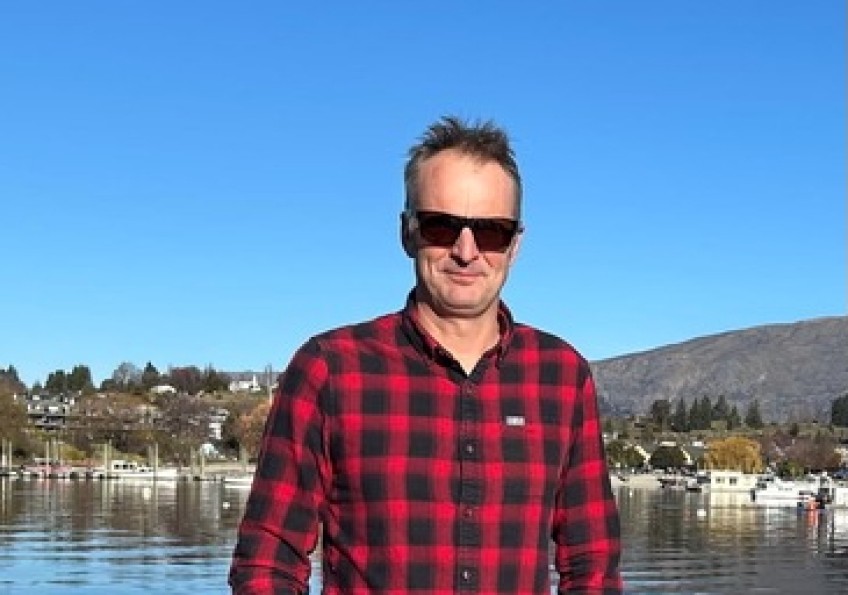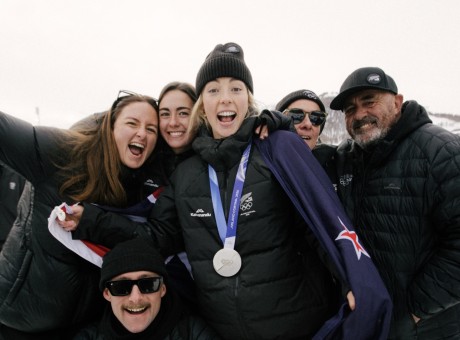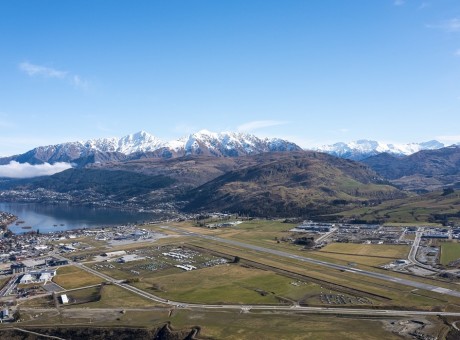Wānaka's Craig Gasson attacks "behind the scenes" councillors

By Amanda Robertshawe.
Craig Gasson contemplated standing for Council in 2022 but, in his words, he “got a bit gun-shy”.
Having overcome that bout of diffidence, he has found the courage to put his hand up in 2025.
“I thought, I'm passionate enough about it, and for some reason, with all my friends and networks, I seem to be the guy that they whinge, moan, and discuss politics with. I've always had an interest in doing it so, I thought, it was just my turn to go for it.”
It is Gasson’s perception of the current Council, rather than the influence of his friends, that’s driving his bid for election.
“I'm a little bit frustrated with how dysfunctional Council is. That's why I put my hand up to say, we need some better people. We need some more functional people. It's a little bit critical of the current Council, I admit that, but, yeah, I just think it needs to be done better. And thought, if I put my name forward maybe some other people would go, if Craig can do it, why can't I?
Gasson’s a qualified viticulturist and vintner, and he’s in the business of selling hot mulled wine, on tap. However, his first attempt at a university qualification is probably more aligned with a political career than wine making.
“I can say I studied political science at university for one year. We used to have tutorials and sit there and talk about Socrates, and all this sort of thing, and Aristotle. Obviously, being an arts degree, wine and cheeses went with it. And the reason why I went into the wine industry was my tutor said to me,
at the end of the year, ‘you're more interested in that Cabernet Merlot than you are in Aristotle and Socrates. You should do that’.”
It’s yet to be revealed how much Gasson remembers of Aristotle and Socrates’ views of the pros and cons of democracy, but he is largely unimpressed by what he’s sees in the current political environment.
“I've been to a few Council meetings. There's division, there's conflict. It feels like it's very ineffective and very sort of tribal at the moment. So that's how I feel. You can't be effective if the team's dysfunctional.”
“Not everyone can have their way. You have to compromise. You have to negotiate. There has to be more of that done where you end up agreeing rather than just saying, ‘This is my idea. You don't agree with it, then I don't agree with yours’. It’s dysfunctional.”
Is this a case of a dysfunctional process, or is it dysfunctional people?
“People. Totally. I wouldn't go into Council thinking I've got a mandate and everything I want to do is going to happen. No, there's going to be negotiations. You might have to ask for amendments to things that you have to concede, to improve it a little bit, and that sort of thing. It's an extremely negotiating job, really.”
“You want leadership, but you've also got to have collaboration.”
What does leadership mean?
“What does leadership mean? It means being able to bring people up and along. You might be a stronger voice. I can be quite a strong voice, but I've also been in environments where I'm not the strongest voice, or it's not been effective for me to be the strongest voice. I might have a really strong opinion on something like an idea, and the beauty of that is, you take it to the team, which is your council, or your fellow councilors, they look at that idea and they say, let's grow this idea. It's a good idea. Or they might say, let's really rip into this idea. And maybe it's not a good idea. So, my sort of view on that is you can check your own ego. Don't be stubborn. Don’t think that you have to be right. It's about collaboration. Leadership is bringing a team while collaborating.”
“Obviously, I've got to have some input. There's no point me just coming along and just voting on everyone else's ideas. You have to have some energy to read, and develop, and inspire, and come up with ideas and projects, and do them.”
“And, if they (the current Councillors) are doing them, they're not reported very well. Self-reporting, you should be letting the public know what you're doing. The worst thing that pisses me off about current councillors is the phrase, “oh, but behind the scenes”.
Transparency is clearly important to Gasson. He appears unfettered by any requisite need to filter his comments in the interests of political expediency. This, of course, means he’s uncommonly transparent. Given the degree of criticism leveled at the current Council, transparency might be a reason Wānaka’s residents will want to vote for him.
“That is just absolute crap. Behind the scenes.” “I could use pretty strong language when I hear that from them.” “There should be no curtain. What's going on behind the scenes? Put it out there. So I'm suggesting have a diarizing thing of, you know, what you're doing, who you're meeting, how you're doing it.
If people see you’re having a go, and doing it honestly, not behind the scenes - let them in behind the curtain, under the hood, they’ll have more belief in you. And that's where the current Council has fallen down with transparency and honesty, openness. Like I said before, if you’ve got an issue, go to the community, say, ‘We've got a problem here, and we're working on it. We want you to know we've got a problem.’ Not this, us and them, and secret squirrel.”
“It's just so poor, it's embarrassing almost, to see people behave like that.”
As well as transparency, honesty, and good communication, Craig Gasson’s developed a passion for Wanaka, and the Queenstown region.
“We’ve got one Councillor who says, ‘Oh, you know, in the big scheme of things, we're the average’.”
“I mean, this is Queenstown Lakes District Council! You know, we're not comparing ourselves to Timaru District Council. This is quite a special place, and to have a Councillor say that they're accepting of average. I just think that's a really low expectation and just doesn't sit well for me.”
Wānaka has changed dramatically in the 24 years Gasson’s made it his home. He’s in no doubt about what should be at the top of QLDC’s agenda.
“Planning growth. Growth is always going to happen. I'm part of growth. I moved here in 2001. This town has changed. People who believe that growth isn't happening, they're just not on the same planet. Growth is inevitable. You can't shut the gates and shut everything off. I hear people say that we should shut the gates to Wanaka and stuff.”
“It's how you structure that growth. I've got two young kids. I would hope, in 20 years time, this is a place they could live. It could be that way. The growth for Wanaka particularly has massive potential. You know, the projections of population growth are huge. So we can learn from Queenstown how, maybe, not to do it, a little bit. We've got an advantage where we're a little bit behind them on that sort of thing.”
What mistakes have they made in Queenstown?
“Serious ones. A classic one, traffic congestion. Just basic infrastructure, struggling with the planning of things to be done there. You can't build 600 houses on Ladies Mile without a plan of how you're going to move people. I mean, you just can't do that without planning how you're going to deal with the downside of things.”
The Ladies Mile development will create 2,400 dwellings but, numbers aside, how would Grasson address the conspicuously inadequate infrastructure?
“You need to have a moratorium on it and say that if you we’re going to do another 2,700 houses, that just cannot be consented, cannot be consented, until there's a plan to deal with it. Otherwise you're just going to collapse.”
“Look, I was saying to someone today, people are moving to this district, they're not deciding between QLDC district and Timaru. I'm picking on Timaru a wee bit. This is a really unique, special place that people come to live here for. You know, there's so many intellectual people that move here that can remote work or have already been very successful in their business. They're not moving to Timaru. They're moving here because of what you can see when you look that picture (of the view, the Wanaka landscape) behind us. And they're moving for that.”
“You can't stop growth, but it's how you manage everything that you do, so that you don't end up with spillage.”
“Someone was telling me about an economic paper done by some Melbourne economist who said, let's just imagine 100 years from now. Let's just have a bit of a throw out here and do it. And the paper was, which I'll dig out and read, is Wanaka will probably hit Tarras in 100 years time. Like the ability of the growth out there would, could, can be unfettered. We've got a lot of flat land, a lot of developable land and I don't see how it's going to stop. Once this town jumps the Cardrona River, it’ll be wildfire, and that'll come.”
The prospect of growth on such a vast scale doesn’t appear to phase Gasson. He’s given a good deal of consideration as to how it might unfold. A self-fulfilling prophecy, perhaps?
“I just believe that the town is bordered by the Cardrona River, and once, say, the Silverlight Studios isn't happening, those people aren't just going to sit on that return it to farming. That will become, I can just imagine, a residential Millbrook, or something like that. People around here always say they can see it as a Millbrook, with a golf course and all that. Once you jump the river, where do you stop next? I'm not sure. I'm not saying I know how to do that, or whether I would be in charge of dictating that, but the growth potential for Wanaka is huge, huge. We've got way more land than Queenstown. Wanaka will eclipse Queenstown.”
If elected, what thought has Gasson given to the modus operandi of Council?
“I have my manifesto. It is on my flyer, and it has things I want to do. It's also got how I'm going to do them. “
“I'm proposing that Council, and Wānaka can do it, if we're allowed to, is have a Project Advisory Board. Councillors are not the intellectual hub of this town. This town has so many current, or retired, massively skilled people from everything such as engineering, finance, entrepreneurial, startup businesses.”
“One of the key things I'll be campaigning on is to be a conduit to tapping that resource. I’ve already started doing that with people who I'm talking to, who are in all sorts of different fields. That's a free thing.”
The people Craig is referring to, in his opinion, have no interest in elected positions on Council.
“It’s where people who have all that experience, and they say, ‘you think I'm going to run for Council for 50 grand a year when I'm doing this? But I will give you my time to have input to things’.”
“So that's one of the key things I want to establish. It's a project specific thing. It's not like some advisory board that literally sits on Council and gets paid, nothing like that. It's people who would be massively interested in this town to come in for two hours, four hours, follow-up meetings to say, this is how I would do this.”
Ratepayers access to Councillors is also on Gasson’s agenda.
“I’ve said stop these crappy drop-in sessions in the middle of the day that no one can go to. I went to one. The advertisement said, come for a friendly chat, a coffee and a biscuit. I went there, got growled at. No one offered me a coffee, or a biscuit.
“Well, that's a shitty experience of local democracy. I went in there after the Shotover thing, and I said, as a Wānaka person, can I just ask about Project Pure?” And then I got barked at by a counsellor.
“They said, ‘Oh, you came in here with a statement’.”
“I should have probably said, this is a question at the end of that statement, and offer me a coffee, or a biscuit.”
“Someone then eloquently explained it a bit better to me, and I said to them as I left, “Do you know how good that explanation was? Wouldn't it be great if you put that out to the community? And they all went, “Yeah, we're not very good at communicating.” I was just like, for fuck’s sake, it's not hard.”
I said, “What you just said to me then, was brilliant. You've put my mind at ease. There's a couple of tanks, and a new one's going in, one will go offline, and that'll be there and timing it not with Warbirds. And then this, so there'll be a little squeeze here.”
“And I said, write it down, publish it, and people will go, “Whew! Better the devil we know and understand, than what we don't know.”
After this unsatisfactory experience, Gasson’s given some thought as to how to improve communication with residents.
“Councils should be quite comfortable diarising their public work that they're doing in office. They should be very transparent who's working, and who's not working, and give them a little bit of a kick along to do that, so you want some transparency that way.”
“And I'm happy to be part of that. Like, here's my diary of the fortnight, or the month. Doesn't have to be a laborious, big document, but it's ‘these are what I've been doing’. Not just I had a coffee with someone from the Tracks Trust. “It's a proper, real diarised engagement so people can look at it and say, Oh, you had a meeting with them. Oh, and two weeks later, you follow that up, there's progress. You know, it's not just a token position of just having coffees and chatting to people. There's got to be movement of projects.”
The provision of safer cycleways for children to ride bikes to school is also on Gasson’s agenda.
He uses this example as an explanation as to how he would lead a Council project.
“I'm really keen on some safer crossings for children to get to school. I think we've got a dysfunctional bike system. If you can't cross a main highway or road, it doesn't work. I've got a six and a nine year old. They can't go to school on their own. That's just a small project there.”
“So as a Counsellor, I might be leading, maybe as a project in Wānaka, what I'm currently working on: a safer crossing for kids to get across Anderson Road.”
“I'm going to lead that on there. I'm going to see the principal on Wednesday morning as a non-council person, so I'm going to lead that project. Then I'm going to look for other people to have input into it. And some people might take that idea even further. I might have an expectation of just getting the pedestrian crossing. Someone might say, why don't we have an underpass? Why don't we have an overpass? Why? You know, so I can lead it. But it doesn't mean that it's mine alone.”
Gasson has also given consideration to the replacement of the QLDC’s Chief Executive next term.
“It's a really good salary package. You should be able to get some very elite person to come on board that can run and manage things. I talked to a couple of local Councillors I won't name, but they said that the framework of the current contract, the KPIs, is so low brow, not really measurable, and that's so that's just an absolute failure.”
“You need to have measurables on a Chief Executive. But in saying that, they're not the enemy. You don't, employ a Chief Executive and then hound them. But you've got to make it a really great space so, hopefully, whoever the mayor is, connects with that person, and then that works, because if there's a disconnect, then that whole side, from the governance side to the council executive team, if there's a dysfunction at the top of the hill there, then you don't ever see the other side.”
What does Gasson mean by an elite person?
“Massively experienced in leadership and governance. You’re probably looking, obviously, for someone from the private sector. We do not need the cycling of people from other Councils. I know it's a bit of an easy thing to pick on. If the council was a real private business, you do not have senior executive people in there that have been there for decades, or, you know, 10 or 12, years.
However, the Council is not a private business.
“To have lifers just circling around other councils, it just creates complacency because if you are in a long-term role, you do not want to complicate your position so all you do is you find the path of least resistance.”
“For council, you should do two, maybe three terms, get out. Refresh, refresh.”
“You'll still have knowledge base in there. It should be a rotating. You shouldn't be a lifer working for the council. I've never done that in my career. I've always moved on to other things and other learnings.”
Given Craig Gasson’s blunt approach to much of what he’s confronted with, does he think he’ll be hitting his head against a wall of ‘due process’ if his election bid is successful?
“I can see how that could potentially happen, but I believe I'd be, so sound like I'm campaigning now, I think I'd be a stronger personality trying to get things across. I'd also speak to the community about what I'm trying to do, and the frustrations I'm having, to try and garner a bit of support to put pressure on the system to change.
What does he mean?
“I mean, well, if I go to Council, and I keep coming back and say, I'm achieving nothing like what is the point of Council? My plumber, the other day, when I said to him, get home, you vote for me this election, he is, what's the bloody point systems and blah this? And he says, ‘You can't change anything.’ And wound his window up and drove off. And I thought he had a fair point. I couldn't argue with him, because if you're a councilor, and this is sort of coming on to another topic, if you have an ineffective mayor, an ineffective chief executive, not doing their part of leadership, then councilors may become obsolete and may not be able to achieve anything.”
Central Government’s drive for growth and the impact on all local authorities, especially QLDC, will become increasingly evident during Council’s next term. The implementation of Regional Deals, private/public investment in infrastructure, and Fast Track approval processes for development, will be on the agenda. How does Gasson feel about the consequential changes? As much as he loves this region, he’s well aware of the shortcomings.
“I think Wanaka is a very dangerous place to be elderly, or ill, very dangerous. Or pregnant. A week before our children were due, we rented a house in Dunedin just to not have that stress. We've got friends who have had kids on the side of the road. They've got Milton on their birth certificate, you know, like they've got to pick a locality on the highway. People would say we're privileged living in Wanaka, and we are, to some degree, look where we live, but it comes at a huge risk. You know, building retirement villages here, Christ, if you have a stroke here, you know, or a heart attack, the clock is ticking. You’re in danger. It's dangerous.”
“How quickly you get a response to medical care is critical to your life. And you know, I've had child with bronchitis, and I've been in absolute panic, and I've gone down to the medical center, and unfortunately, to the poor lady on the phone, had to use some quite strong language of the fact that I'm a father, this is my child, and he's having trouble breathing. I don't give a rat's ass if the nurse has to decide whether she wants to come in or not. You tell her to get her effing ass in here, now.
Then I've rung friends who are doctors, and they’ve said, Look, we can't do anything. We're not allowed to do anything. The panic and the stress of that, you know, there's no E.D. to go to. There's nowhere to go to. It's, bizarre how the Government knows the data’s there about the growth of this town. This bullshit thing about, “oh, it was unexpected”. I mean, it's a small place, you know, and it's growing. It's not like it's over a hill and disappeared through some forests. It's in plain sight. To say that they didn't understand it, or misinterpreted growth. It sort of shows how poorly we've been represented by MPs in the past.”
Gasson is critical of manner in which Central Government’s driving growth.
“They're wrong. They're misdirected.”
Is he going to tell them that?
“Look, I'm not going to stop them. No, I'm not.”
However, in his inimitable fashion, Gasson’s thought of a solution.
“They've got to remember this. The difference between Queenstown and Wanaka is our electoral boundaries. We're Waitaki. You guys are Southland. So we've got two different MPs. You've got two, pretty safe, National seats sitting here.
“I jokingly say this, if Wanaka needed better representation from central government, we're in the Waitaki district, you'd get Richie McCaw to stand as an independent. And then you would go to Oamaru and say, ‘What two things do you need? Hospital? Yes. And what other things? Sewage upgrade?’ Bang.”
“Then you go to Wanaka. ‘What do you want? This? This?’ Richie McCaw would become the first independent MP in New Zealand, because he's born between the two of them. This is just a hypothetical joke, but if you had that, and then you had an MMP election, he'd romp him. He's got leadership skills. He'd romp him. He'd go to central government, and he'd have a network of people that would be all behind them. He'd be the most, you know, supported MP in the history of the district.”
“The current way of doing it, like we get, we get just lip service.”
If Craig Gasson is successful, how does he think he’ll reflect on his three years in office?
“I don't think I'm going to be some inspirational, aspirational, leader that you know, in 50 years time they’re going to say, ‘Do you remember Craig Gasson? ‘Yes, that was his statue’.
“Yeah, no, I'll be happy with a really good sewerage pipe named after me, or an oxidation pond. I don't care. I'm not into it for that.”
“Yes, I am very prepared. I get, literally, everyone goes, ‘Why are you doing this?’ I feel like it's my turn. Got to do it. I've talked about it. Nearly did it last term, nearly did it. Chickened out. And then this time. The hardest thing was just deciding, I'm going to do this, put my name out there.”
























